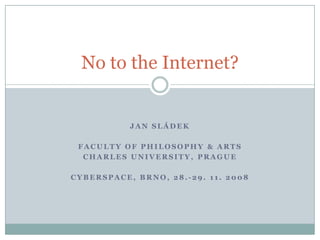
No To The Internet
- 1. J A N SLÁ D EK FA C U LT Y OF PHI LOSOPHY & A RT S C HA RL ES U NI VERSI T Y, P RA GU E C YB ERSPA C E, B RNO, 28.-29. 1 1 . 2008 No to the Internet?
- 2. Inspiration 29.11.2008Jan Sládek 2 Manuel Castells (2001) „If you do not care about the networks, the networks will care about you anyway.“ Alan McCluskey (2006) „Will people be free not to have access?“ „Strangely enough for a proclaimed ‚knowledge society‘, emphasis continues to be placed on the possession of mass produced tools rather than on the individual development and use of knowledge“ Sharon Ungar (2003) Does knowledge economy produce knowledge society? Information overload leads to „knowledge aversion“ (being proud of ignorance, Internet substitutes the stock of knowledge at hand, less public knowledge) Neil Postman (1985) Information must be amusing Telegraph intoduced irelevancy, incoherency and powerlessness Jan A. G. M. van Dijk (2005) Motivational Access (I don‘t want/need it)
- 3. The data 29.11.2008Jan Sládek 3 WIP 2005-2008 (D. Šmahel) Czech men and Czech women in cyberspace project (P. Soukup et al.) The Actor and Risks (dept. of sociology, J. Buriánek) Falling through the Net, 2000, National Telecommunications and Infromation Administration, USA
- 4. Which part of NO don‘t you understand? Similar to 1998 40.8% seniors „do not want“ 20%-30% „do not want“ regardless the income 25%-34% „do not want“ in all education groups 4 29.11.2008Jan Sládek • Falling Through the Net, NTIA, 2000, n=48,000 (US Census) • 61.6 mill. not connected, 10.8 mill. computer, 8.7 mill „never“ Reasons for U.S. Households with a Computer/Web TV Never Accessing the Internet
- 5. Which part of NO don‘t you understand? 5 29.11.2008Jan Sládek Reasons for U.S. Households Discontinuing Internet Access Falling Through the Net, NTIA, 2000, n=48,000 (US Census) 4 million „drop-offs“ both in 1998 and 2000 Almost 1/3 „computer related“ drop-offs ¼ „motivation related“ drop-offs Low motivation associates with age Households with higher income do not have time
- 6. 18% 21% 39% 15% 4% 3% Not interested, not useful Do not know how to use No computer, no connection Too expensive Czech „No to the Internet“ 6 29.11.2008Jan Sládek The main reason for not using the Internet WIP 2007, 2008, n=1623, age 12+ Internet penetration in CR: 55% (2007), 57% in 2008 22% non users lack motivation 54% non users have material barriers Motivation declines with age Lack of motivation („not interested“) prevails in: • Households with monthly income higher than 25,000 CZK • Villages and small cities (up to 5,000 inhabitants) • older than 30 years
- 7. Focus groups with nonusers: Key findings 29.11.2008Jan Sládek 7 Czech men and Czech women in cyberspace project Three focus groups, 8-10 respondents, age 16-60 In most cases parents Have no control over their children‘s online activities Are aware of some risks (molesting, „explicit content“) Knowledge gap between them and their children Do not recognize various possibilities of the Internet The Internet perceived as: Waste of time Container for unreliable or dangerous information
- 8. Do the users spend less time by cultural activites? 29.11.2008Jan Sládek 8 Cinema, theatre, music, reading etc (WIP 2008, hours per week) 9% of users do not perform these activities (14% in nonusers) 20% of „not interested in the Internet“ do not perform these activities as opposed to 10% who stated economical reason Not associated with intensity of Internet use and experience Average time spend: Seven hrs for users, eight for nonusers 7.4 hrs (not interested), 8.7 (material barrier) Is this a substantial difference?
- 9. Leisure time - fun or education? 29.11.2008Jan Sládek 9 In your leisure time, do you prefer studying or to having fun? Education or fun by age group % within Age groups Age groups Total 15-30 31-45 46 and more Education 32 40 43 38 Undecided 28 21 16 22 Fun 40 38 41 40 Actor and Risks, 2005, n(only users)=1373
- 10. No means no? 29.11.2008Jan Sládek 10 The change from freedom of access to a must Universal dependence: security and social risks Attack on the „knowledge society“ ? Total inclusion or keeping the alternatives in sight No – or mere „not yet“? Research agenda: Focus on off-line activities (leisure time) and skills Look for the groups who deliberately reject the Internet as part of their life-style
- 11. Will the Internet….go wrong? 29.11.2008Jan Sládek 11 Download this presentation at http://jansladek.eu
